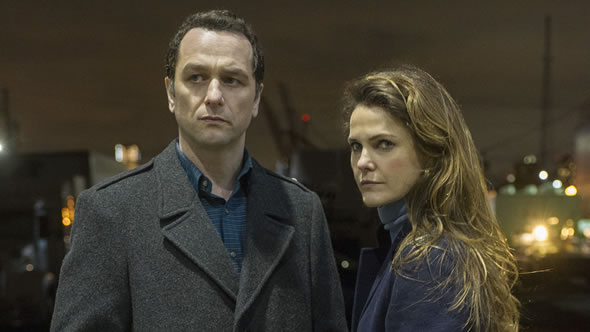In keeping with the retro theme of this website, I’ll review the series finale of The Americans, a TV series that takes place during the decade of my childhood; the 1980s.
Last night my wife had a little time to relax and watch some TV. “How about we watch The Americans? Look it’s episode ten, we should have three more episodes left after this one.” Then we saw the caption, “Series Finale.”
Spoiler Alert! This is a series finale review.
I wasn’t prepared, neither of us were! I assumed, falsely, that because very other season had 13 episodes, so would this one. Going into the season, I wasn’t even sure that this was indeed the last season. I watched most of the previous seasons on Amazon and was oblivious to most of FX’s promotions. I read one synopsis that this would be the penultimate season of the series, but penultimate means “second-to-last,” a word we often misused as “last” in our lexicon. After cutting the cord four years ago (coincidentally the time I began cohabiting with my wife), I finally succumbed to the allure of PlayStation Vue. I convinced my wife that we should subscribe to PlayStation Vue so we could not only record and watch shows at our own convenience, but so we could watch series finale episodes live. That was our plan for The Americans, to watch the series final live. I didn’t want any spoilers like I had with Breaking Bad. (thanks front page of the Post!)
I digress. I wasn’t prepared for this to be the last episode of the series and it impacted my expectations. What were my expectations? If we had known it was the last episode, my wife and I would have discussed our own expectations that week leading to the final episode! Instead, we dived in, face first into the deep unknown.
The Power Scenes
There were two power scenes that stood out. The first of which, FBI agent Stan Beeman confronts the Jennings family and exposes them for who they really are, killer KGB agents. Stan pulls a gun on them during the confrontation, he orders Philip to get on the ground. Philip, defiant, refuses. He knows that if he obeys, he’ll cross a threshold; one that will end either in arrest or a violent escape. Memories of Breaking Bad and the untimely demise of Hank Schrader jumped into the minds of my wife and I, we were afraid the same fate would befall Stan. Elizabeth kept her hand busy near the opening of her coat, we just knew she scheming a violent escape!
We love Stan Beeman. He is a flawed hero, and that’s what made him so interesting. He cheated on his first wife, he failed to connect with his own son. He is fallible, far from a perfect human being. When Stan did falter, he tries to redeem himself, albeit often unsuccessfully. He tries to repair his relationship with his first wife and his son, but to no success. Stan’s family vanishing from the last few episodes seems to parallel the idea that they have disappeared from Stan’s life. These unsuccessful attempts at redemption are apart of what makes Stan so appealing, so human. Not every problem or relationship can be repaired. However, Stan does appear to be a good husband to his second wife, and forms a connection to Henry; one resembling that of a father and son. Stan keeps taking the hard knocks of family life and life inside the Bureau and he continues getting off the mat and moving forward. The man loves his country and he is willing to sacrifice himself to defend those he is loyal to. His loyalty to his friends and his own resiliency embody the virtues many Americans strive for.
Stan and Philip have a real connection, albeit under the pretense of a lie. That’s what makes this scene work, ultimately the two can’t hurt one another. Even though all three Jennings are implicated in KGB activities, this scene is about the breakup of the bromance between Philip and Stan. The men were best friends, but their loyalties divided them. After Philip’s initial denial early in this scene, Philip comes clean to Stan. “You were my best friend too. My only friend.” We empathize with Philip on a higher level than we have throughout the series thus far. We see a lonely man as he confesses the things we all thought he was thinking up until this point. In his confession we see a lonely man, a man who’s lost, a man who can’t remember why he even joined the KGB save for the fact he wanted to help his country. On this last note we see the parallels between Phillip and Stan, both men defend their country the best way they know how; espionage. It’s like the breakup of a romance in which the two partners still care about one another but they have reached a point of no return in which the relationship can’t move forward. Philip’s loyalty to another entity, Mother Russia, amounts to irreparable infidelity for this bromance.
Before parting Philip offers one last piece of advice, Stan’s new wife might be a KGB agent but there is “no way to know for certain.” It’s a final act of friendship on the part of Philip, he’s warning his friend and geopolitical opponent that his wife might also be a spy. Maybe the hardest thing a friend can do for another friend is to express a displeasure about their significant other. It threatens a friendship because it forces one friend to divide loyalties between a partner and a friend. One could look at this as a ploy of Philip’s to manipulate Stan into believing Philip deserves to go free. He is being truthful and is no longer a threat to America, here is confidential information that may help you and your country. However, it’s clear Stan is already letting the Jennings go free, they are getting into their car and Stan no longer has his gun drawn. When considering these factors, Philip offers this difficult information to Stan as one last act of friendship. Stan in turn offers his last act of friendship and lets them go free, with the understanding that he would look after young Henry Jennings. It’s not the first time Stan chose friendship and loyalty over duty to country, Stan once stood in the way of Oleg Burov becoming a double agent in an attempt to protect his one-time ally. Both Philip and Stan commit acts of treason in favor of friendship, Philip exposes a possible Soviet KGB agent and Philip allows three KGB agents to escape the country. In this moment friendship triumphs over national loyalties but this is Philip and Stan’s last act of friendship toward one another, as cold war nationalism resume.
The second power scene lacked the dialogue of the first, it didn’t need it. Philip, Elizabeth, and Paige approach the Canadian boarder on a single train, but seated on different train cars. Boarder patrol enters the train to check everyone’s passport to see if they match the sketches of the fugitive Jennings family. Their disguises allow them to escape the odds (although I believe those boarder patrol agents were careless and should be sanctioned in some way), but both parents are surprised, horrified, and heartbroken to see Paige has stepped off the train. During this escape the audience sees the fruition of years of planning for this situation in which the Jennings family needs to drop everything at a drop of the dime and flee the country. Everything works according to plan (they don’t even need to kill anyone!) save for the fact Paige defects from the Jennings family. The picture above is symbolic of Paige’s decision, a point of no return. She’s on her own.
What happens to Paige from here on out is anyone’s guess. True, she defected from the KGB branch of the Jennings family, but has she defected from the KGB and the cause of Mother Russia? Next we see Paige letting herself into Claudia’s apartment, the Jennings’ KGB handler. Claudia has fled the apartment and Paige sits down to pour herself a bottle of vodka. The question remains, why did Paige go to Claudia’s apartment? Did she go there to confront her, or to get her next orders? Or was it because it was her last place of comfort? Claudia was the closest thing Paige had to extended family.
Paige won’t be prosecuted by American authorities, the FBI was looking for two illegals, not their children. The only people who are aware of Paige’s KGB dealings are Stan and presumably her brother Henry. Stan won’t turn her in, he had his chance to bring the family to justice before, implicating Paige now would be indicting himself for letting the family escape. It appears Paige’s loyalty was strongest to Henry, he’s the ultimate reason she stayed behind. He was her biggest objection in leaving. What questions would Henry ask and what questions would Paige answer? One would think she would be honest with Henry, she objected to her parents’ own dishonesty. The question is, how honest will Paige be with herself in the coming future? She has already lost faith in America, but did she also lose faith in the cause of the Soviet Union?
Satisfying ending?…
My initial reaction was no. Remember, I didn’t have time to reflect properly before watching the series finale; I thought there would be an additional three episodes. The rule of law does not prevail, justice was not served. My wife and I wanted Elizabeth and Philip to be apprehended or killed. We wanted to see justice. Philip and Elizabeth killed many innocent people during their missions. When they didn’t kill people, they destroyed their lives. We felt betrayed by Paige, for the majority of the series she was innocent and the embodiment of what’s good in people. She turned. Although she did not kill, she served those who did. She was naive, and her nativity deserved some sort of punishment.
After some time to reflect I pivoted, I changed my mind. While the rule of law was not honored, a different type of justice was served. During the whole run of the show Philip and Elizabeth were prepared to die for their country, they were not afraid of the prospect; martyrdom would have been an honor. Philip and Elizabeth would never have been apprehended alive, as evidenced by the way they handled Stan when he confronted them, so imprisonment would not have been a viable option for the ending of the show.
Despite all of the fights they had, the one thing that kept them together was their kids. The one thing they feared was the inability to protect their children. They were prepared to flee the country with their children, evidenced by their exit plan that included Canadian passports for all four of them. The one thing the Philip and Elizabeth were unprepared for was to abandon both of their children. After a brief argument, Elizabeth conceded to Philip it would be best to leave Henry in America. When Paige defected from the family, Philip and Elizabeth were left alone to return to the Soviet Union, orphaned by their own children. They returned to their motherland but after being gone for so many years they were returning to a foreign land. Philip and Elizabeth were permanently cut off from both of the children they had together, the most painful endgame option for the two of them. They have to live the rest of their lives with the reality of being isolated from both of their children and the idea that both of them may hate and never forgive them. Save for physical harm coming to their children, this is the worst case scenario for Philip and Elizabeth Jennings, the worst punishment they could endure. A different type of justice was served, Philip and Elizabeth would have to suffer like the many whose lives they destroyed.
Other thoughts
I’ll miss The Americans, I very much enjoy every season save for the fifth season when Paige turned. In retrospect, Paige turning during the fifth season was an essential part of the narrative and conclusion to the sixth and final season. Aside from the cat-and-mouse game between the FBI versus the KGB, I’ll miss the setting of 1980s America. I was a child in New York during the 1980s, and my wife was also born in the 1980s. She was born in Lithuania, a country which was at the time occupied by the Soviet Union. This gave this show an interesting dynamic for the two of us. During the time this show takes place each of us lived on opposite sides of the spectrum, worlds apart. Each of us saw glimpses of the world we came from and it was nice to share that with one another. She understood the Russian dialogue in the show, and could tell me how well it was delivered. Her country having suffered many years at the hands of the Soviet Union, she rooted harder than I did for the Jennings to be caught; in particular Elizabeth. Even though he was a ruthless killer KGB agent, each of us found redeeming qualities in Philip. We empathized that he was a slave to his loyalties, to his country and his wife; both of whom never truly appreciated him.
During penultimate (second-to-last) episode of the series, Elizabeth assassinates the would be assassin of Fyokor Nesterenko, a Russian diplomat brokering peace between the world powers. I turned to my wife excitedly and said, “City College!” Both of us went to City College for grad school, her when we met and me a few years later. It was another connection we shared with the show, something that represented each of us.
Oleg Burov is the sacrificial lamb and that’s unfortunate. In a world of cold war loyalties, his loyalties were to peace and a better world. I hope Oleg is released by authorities, but it’s doubtful. He’s proved to be a good man, a man who acts on his conscience. He was one of the characters we were rooting for despite the cloud of impending doom that has followed him the past few seasons.
Philip may run into his other biological son Mikhail, it seems as if the two could connect on similar political ideas. However, that potential relationship could be the breaking point for Elizabeth, Elizabeth being jealous of Mikhail’s mother Irina Semenova.
I would have liked to have heard at least one mention of an up and coming star in the KGB, Vladimir Putin. I understand why the show shied away from this, many of the actors are Russian and any sort of free characterization of the authoritarian president of Russia could be dangerous for any Russian. That being stated, a small reference to the future dictator could have been made in a very benign fashion. They did not have to implicate Putin to a particular assassination plot, but his name could have been brought up in the politics of the KGB.
At the same time, I’m happy The Americans ended on a high note. Many shows hang on for too long, and they do so because we continue to watch. We thought that this might be happening during season five, but season six was excellent. Season six did not force the show’s own standard of thirteen episodes, it ended when it was complete. I am very satisfied with The Americans and I’ll continue to recommend the show to new viewers. Being a period piece about the continuing evolution of the relationship between world powers, this show will stand the test of time.


